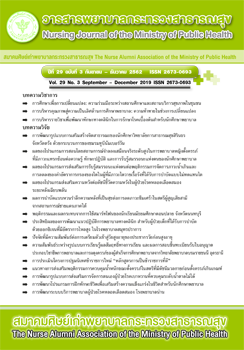Effects of a Self-efficacy Enhancement Program on Fluid Overload Management Behaviors and Decreased Glomerular Filtration Rate among Persons with Chronic Kidney Disease Receiving Non-renal Replacement Therapy
Main Article Content
Abstract
This quasi-experimental research aimed to explore the effects of a self-efficacy enhancement (SEE) program on fluid overload management behaviors and decreased glomerular filtration rate among CKD persons. The sample included 52 persons with CKD receiving non-renal replacement therapy services at the renal clinics of Trakarnphuetpol Hospital or Phibun Mangsahan Hospital between August 2018 and April 2019. Research instruments consisted of 1) the SEE program based on Bandura’s concept, 2) a fluid overload
management behaviors’ handbook, 3) a self-efficacy in fluid overload management of CKD persons receiving non-renal replacement therapy tool, 4) a fluid overload management behavior questionnaire, and 5) a glomerular filtration rate record form. Data were analyzed using descriptive statistics, independent t-tests, and chi-square tests. The results revealed that the mean score of fluid overload management behavior of the experimental group was statistically significantly higher than those of the control group (p<.01). However, the proportion of participants with decreased glomerular filtration rates was not different between the control group and the experimental group. The findings of this study support the SEE based-on Bandura’s concept that can enhance an appropriate fluid overload management behavior among CKD persons. Therefore, this SEE program should be integrated with the usual care. Also, a longitudinal study to explore the effects of this SEE program is recommended to confirm the sustainability of fluid overload management behavior and decreased glomerular filtration rate.
Article Details
บทความและรายงานวิจัยในวารสารพยาบาลกระทรวงสาธารณสุข เป็นความคิดเห็นของ ผู้เขียน มิใช่ของคณะผู้จัดทำ และมิใช่ความรับผิดชอบของสมาคมศิษย์เก่าพยาบาลกระทรวงสาธารณสุข ซึ่งสามารถนำไปอ้างอิงได้
References
2. Chittinandana A, Chailimpamontree W, Chaloeiphap P. Prevalence of chronic kidney disease in Thai adult population. J Med Assoc Thai. 2006;89(Suppl 2):S112-20.
3. Ingsathit A, Thakkinstian A, Chaiprasert A, Sangthawan P, Gojaseni P, Kiattisunthorn K, Mittal B. Prevalence and risk factors of chronic kidney disease in the Thai adult population: Thai SEEK study. Nephrology Dialysis Transplantation. 2010;25(5):1567-75.
4. The nephrology society of Thailand. Clinical Practice Recommendation for the Evaluation and Management of Chronic Kidney Disease in Adults 2015. [internet]. 2015. [cited 2017 November9]. Available: http://www.nephrothai.org/images/10-11-2016/Final_%E0%B8%84%E0%B8%A1%E0%B8%AD_CKD_2015.pdf. (in Thai).
5. Rattanakun C. Food therapy in patients with chronic kidney disease before dialysis. [internet]. 2015. [cited 2017 November 11]. Available: http://nephrothai.org/images/nephrothai/know/updated.pdf. (in Thai).
6. Sawasdee P. Factors related to the choice of treatment methods among persons with pre-dialysis chronic kidney disease [Master thesis]. Chiangmai: Chiangmai University.2019. (in Thai).
7. Trakanwanich T & Sirimongkolchaikun O. Guide for people How do kidneys fail. 2thed. Nonthaburi: B.S. Advance;2018. (in Thai).
8. Tsai YC, Tsai JC, Chen SC, Chiu YW, Hwang SJ, Hung CC, Chen HC. Association of fluid overload with kidney disease progression in advanced CKD: a prospective cohort study. American Journal of Kidney Diseases. 2014;63(1):68-75.
9. Caravaca F, Chávez E, Alvarado R, García-Pino G Luna E. Sudden cardiac death in non-dialysis chronic kidney disease patients. Nefrología (English Edition).2016;36(4):404-9.
10. Khan S, Floris M, Pani A, Rosner MH. Sodium and volume disorders in advanced chronic kidneydisease. Advances in Chronic Kidney Disease.2016;23(4):240-6.
11. Nozaki C, Oka M & Chaboyer W. The effects of a cognitive behavioral therapy program for self-care on hemodialysis patients. International journal of nursing practice.2005;11(5):228-36.
12. Welch J, Dowell S & Johnson C S. Feasibility of using a personal digital assistant to self-monitor diet and fluid intake: a pilot study. Nephrology Nursing Journal.2007;34(1):43-8.
13. Aliasgharpour M, Shomali M, Moghaddam MZ, Faghihzadeh S. Effect of a self-efficacy promotion training program on the body weight changes in patients undergoing hemodialysis. Journal of renal care. 2012;38(3):155-61.
14. Khamsombat N, Prachusilpa G. Effects of using primary nursing care of patients with end stage renal diseases on excess water and nursing services satisfaction. Journal of The Royal Thai Army Nurses. 2014;15(2):405-13. (in Thai).
15. Thussabut N, Siriwatanamethanon J, Buatee S. Model for prevention volume overload of end stage renal disease among hemodialysis patients. Journal of nurses’ association of Thailand, north-eastern division. 2013;31(4):89-96. (in Thai).
16. Ratanakitsunthorn S. Self-management behaviors and volume overload in patients with CAPD receiving self-management program [Master thesis]. Bangkok: Rangsit University.2013. (in Thai).
17. Boonchan K. Self–monitoring, self–evaluation about volume overload, and volume overload symptoms among continuous ambulatory peritoneal dialysis, end stage renal disease patients [Master thesis]. Mahasarakham: Mahasarakham University.2015. (in Thai).
18. Yowaphui P. Effect of the self-efficacy and social support enhancement program on exercise behavior among the elderly with chronic renal failure [Master thesis]. Chiangmai: Chiangmai University.2008. (in Thai).
19. Thotankham S. Effects of the self-efficacy and social support enhancement program on disease control behaviors and serum creatinine level among elders with chronic renal failure [Master thesis]. Chiangmai: Chiangmai University.2012. (in Thai).
20. Sirimo P. Evidence review on best practices of fluid overload management for persons with Chronic Kidney Disease [Master thesis]. Chiangmai: Chiangmai University.2014. (in Thai).
21. Bandura A. Self-efficacy: the exercise of control. New York: W. H. Freeman; 1997.
22. Burns N, Grove SK. The practice of nursing research appraisal, synthesis, and generation of evidence. 6th ed. St. Louis: Saunders Elsevier; 2009.
23. Qiao J, Shan Y, Chen Q, Xu ZP. Design and application of weight gain graphs based on Bandura’s self-efficacy theory for patients on maintenance hemodialysis. International Journal of Nursing Sciences.2014;1(1):110-6.
24. Sanitpol W, Jaratham N, Prayong C. Effects of the self-efficacy enhancement program on disease control behaviors among chronic kidney disease with stage 3 and 4 at kidney Department, Lamphun Hospital. Lanna Public Health Journal.2017;13(2):48-63. (in Thai).
25. Panpeankunpak P. The effect of food control program for chronic kidney disease patients at CKD clinic, Phra Nakhon Si Ayutthaya Hospital. Journal of Preventive Medicine Association of Thailand.2017;6(3).205-15. (in Thai).

